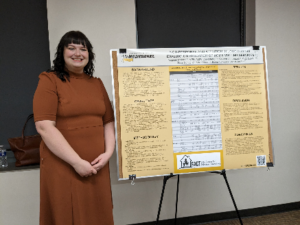The mission of the Institute for Child and Family Well-Being is to improve the lives of children and families with complex challenges by implementing effective programs, conducting cutting-edge research, engaging communities, and promoting systems change.
The Institute for Child and Family Well-Being is a collaboration between Children’s Wisconsin and the Helen Bader School of Social Welfare at the University of Wisconsin-Milwaukee. The shared values and strengths of this academic-community partnership are reflected in the Institute’s three core service areas: Program Design and Implementation, Research and Evaluation, and Community Engagement and Systems Change.
In This Issue:
- Meet the ICFW
- Program Design and Implementation
- Research and Evaluation
- Community Engagement and Systems Change
- Recent and Upcoming Events
Meet the New ICFW Team Members
Meet our new Research Program Coordinator and MSW interns.
Meghan Majors is a new research program coordinator with the Institute for Child and Family Well-Being. She helps to coordinate several projects, including the IV-E Public Child Welfare Training Program (CWTP) and the evaluation of Wisconsin’s Family Foundations Home Visiting Program. Prior to this role, she worked as a graduate research assistant at ICFW on the Families and Children Thriving (FACT) Study. Her areas of interest include program implementation and evaluation, specifically around child maltreatment and mental health.
Meghan earned her Bachelor of Science in Psychology at the University of Minnesota-Twin Cities. She graduated with a Master of Public Health and a Master of Social Work from UW-Milwaukee.
Masters of Social Work Interns

Andrea Bailey is in her third semester as an intern at the Institute for Child and Family Well-Being and is completing her Master of Social Work at the University of Wisconsin-Milwaukee (August 2023). While at ICFW, Andrea has had the opportunity to be involved with the Strong Families, Thriving Children, Connected Communities initiative, participating in its various strategic activities as well as working toward completing Parent-Child Interaction Therapy training.
Prior to moving to Milwaukee, Andrea lived in Lancaster, Pennsylvania, where she directed a language program working with refugees from around the world. She also has experience working with youth in foster care, specifically adolescent mothers and their children. Andrea is also an adoptive parent, networking with foster/adoptive families raising children impacted by trauma. Andrea’s interests include working with children and adults affected by trauma, as well as systems-level work that seeks to strengthen the relationships and communities in which they live.
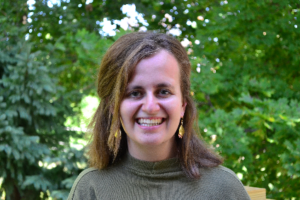
Jill Finnel graduated from Marquette University as a Burke Scholar with a Bachelor’s Degree in Psychology, Spanish, and International Affairs. As an undergraduate, she was a research assistant at Milwaukee Trauma Outcomes Project and interned with the Benedict Center Sisters Program.
Jill then worked at Children’s Wisconsin Community Services as an Intensive In-Home Family Support Specialist. She is currently pursuing her Master of Social Work at University of Wisconsin-Milwaukee and completing her internship at the Institute for Child and Family Well-Being. Jill is completing her current degree in the hopes of becoming a School Social Worker for the Milwaukee Public School District.

Joe Moreno is an intern with the Institute for Child and Family Well-being. He has several years of experience in childhood education and direct services for children and families.
He is involved in ICFW projects ranging from therapeutic services to skill-building workshops to systems-level coalitions. Currently, Joe is training in Parent-Child Interaction Therapy to obtain certification and looks forward to adding this to his therapeutic toolkit to better serve children and their caregivers.
Joe earned his bachelor’s degree in philosophy, graduating with honors from the University of Wisconsin-Madison. He is completing a Master of Social Work alongside certificates in trauma-informed care and substance abuse counseling from the University of Wisconsin-Milwaukee. His degree is specialized in providing clinical services to children.

Sylvia Onyeiwu is a Master of Social Work student at UW-Milwaukee and an intern with the Institute for Child and Family Well-Being. With over 7 years of experience in Branding, Communication, and Human Resources, Sylvia has worked with start-up and charity organizations in brand development, internal processes and policies, and communication that promotes the well-being of staff and clients.
Her academic interest is primarily focused on Trauma-Informed Care, particularly problem-solving technique models like Human-Centered Design and Trauma Screening, Brief Intervention, and Referral to Treatment (T-SBIRT). She is also interested in macro-level policies and systems and exploring the issue of neglect within the family and child welfare system.
She previously earned her Bachelor’s degree from the University of Port Harcourt, Nigeria in Religious and Cultural studies and majored in Gender.
Program Design and Implementation
The Institute develops, implements and disseminates validated prevention and intervention strategies that are accessible in real-world settings.
Introducing Building Brains with Relationships Workshops
Building Brains with Relationships (BBwR) is a one day workshop with an additional opportunity to continue skill building in a virtual Community of Practice in the upcoming weeks and months.
First, participants:
- Build a shared understanding of the power of relationships and connection on brain architecture;
- Confront the great nature versus nurture question while playing the Brain Architecture Game.
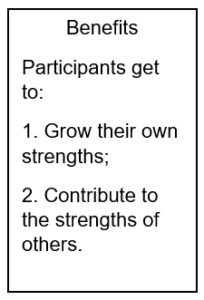
Then, participants add to their protective factors, sometimes called strengths, by practicing skills that are shown to strengthen relationships, create partnerships and increase desired outcomes.
Although the topic feels serious, it’s a highly useful and dare I say good time, as far as workshops go, of course. At the debut event in February, initial relationships across systems were made thanks to the wide array of participants present. Those participants will be able to continue building those relationships in the virtual Community of Practice to come.
If you’d like to attend a workshop and/or join the Protective Factors Community of Practice at an upcoming date on April 20th, June 14th or November 15th, create an account here and after that, email wcwpds-mke@uwm.edu with your desired ticket date to reserve your seat. All dates will be hosted at the Wisconsin Child Welfare Professional Development-UWM extension site at 4425 N. Port Washington Road, Suite 400, Glendale, WI 53212.
Learn More:
Building Brains with Relationships
Mobility Mentoring
By Gabe McGaughey and Jill Finnel
Children thrive when they have regular interactions with responsive, caring adults. Families experiencing significant stressors can be overloaded with stress, interrupting those interactions. The prolonged stress of poverty negatively impacts those interactions as well (Babcock, 2016). Children in economically insecure households are seven times more likely to experience neglect (Dolan, 2011), and nearly 85% of families investigated by Child Protective Services earn below 200% of the federal poverty line (Sedlak, 2010). The prolonged stress of poverty negatively impacts a family’s ability to gain the skills needed to move out of poverty on their own (Babcock, 2016).
Mobility Mentoring®, an approach developed by EMPath, involves working with and coaching families to obtain resources, develop skills, and create sustainable behavior changes to become economically independent. Participants work with a trained mentor or coach to assess family life, finances, education, health, and career. Participants set long-term goals and create a plan using the Bridge to Self-Sufficiency®. In 2022, Children’s Family Support and Preservation Home Visiting, Employment and Education Services, and Family Support programs participated in an implementation cohort with EMPath through Children’s Home Society of America (CHSA).
Implementation is the art and science of incorporating innovations into typical human service settings (Fixen, et al, 2009). The process of integrating Mobility Mentoring (MM) practices, principles, and tools into existing workflows is an iterative one. This project is integrating Mobility Mentoring into existing evidence-based interventions such as Healthy Families America (HFA) Home Visiting, as well as becoming the more central practice framework for our Employment and Education Services and Family Support programs, all of which operated with different target populations in different geographic regions. In total, this model implementation includes three programs and seven sites from across Wisconsin.
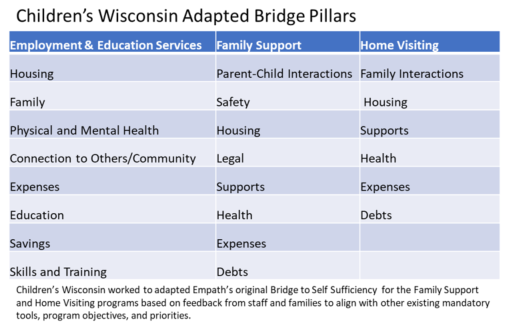
The ICFW will be compiling lessons learned from this project throughout 2023, but we wanted to start with insights gained from the adapted Bridge to Self-Sufficiency and staff perspectives. Mobility Mentoring begins with a self-assessment to set participant driven goal setting. Families then work with their Home Visitor/Family Support worker/Employment and Education specialist who are trained as MM mentors to assess their family life, finances, education, health, and career. Participants set goals, create action plans, and track progress on the Bridge. Staff acknowledge participants’ efforts and celebrate successes, and obstacles that have been overcome.
The Bridge is the central assessment and planning tool developed by EMPath, containing pillars which represent different areas that impact family stability. These bridges have been modified to align with existing program objectives and constraints based on feedback from families and staff.
Each of the pillars is split into five sections, or rungs. The lowest section corresponds with the lowest amount of skill or capacity in that pillar. The highest section corresponds with the highest amount of skill. Participants are then asked to choose the section of the pillar that best represents their skill level in each category. A participant that chooses the lowest rung is demonstrating that they have low skills in that pillar of the Bridge. A participant that chooses a higher ring is demonstrating increased skill. Scores are then combined from each of the eight pillars. This combined score comprises a participant’s Bridge Score.
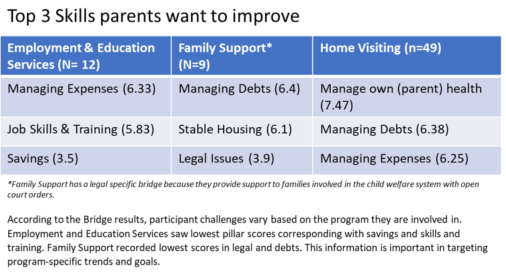
Across the implementing programs we looked at the three lowest pillar scores parents identified as wanting to develop the most, seven of them are financially related. While families are mostly referred to Children’s Wisconsin programs initially for support or education around parenting practices, MM has provided tools like the Bridge that helps us explore what the families’ most important priorities are, which are often underlying stressors tied to financial insecurities that impact parenting. Combining evidence-inform processes from MM, that provide staff with training and tools to be able to engage families around financial challenges, provides a compliment to established evidence-based interventions focused on parent-child interactions. While policy and structural changes are needed to reduce economic hardships that contribute to families being overloaded and becoming involved with the child welfare system, Mobility Mentoring provides families and staff a framework to navigate current state barriers to economic self-sufficiency.
Learn More:
Children’s Wisconsin Family Preservation & Support programs
ICFW Practice Brief – Mobility Mentoring
Research and Evaluation
The Institute accelerates the process of translating knowledge into direct practices, programs and policies that promote health and well-being, and provides analytic, data management and grant-writing support.
Spotlight on Home Visiting: Translating Research into Practice and Policy
For more than a decade, ICFW faculty have worked with the Wisconsin Department of Children and Families (DCF) to evaluate the Family Foundations Home Visiting Program. Guided by a community-university partnership model, these activities have helped to shine a light on children and families that enroll in home visiting programs as well as the providers and agencies that offer these services. ICFW and DCF are now collaborating with four other states and Washington, D.C. on a coordinated evaluation that focuses on family engagement and health equity. ICFW also has joined forces with health departments in Racine and Walworth Counties to develop a universal program that will ensure all families have access to nurse home visiting services soon after the birth of a child.
Home Visiting Publications
ICFW faculty have headed several home visiting research projects, including the FACT Study, Healthy Families Study, and REACH Project. Below is a list of recent ICFW publications related to home visiting programs and the families they serve:
Increasing equitable access to home visiting (in press).
Adverse adult experiences and health outcomes: Racial and ethnic differences in a low-income sample (in press).
Secondary traumatic stress among home visiting professionals (2022).
Quasinatural experiment of postnatal home visiting (2022).
Impact of home visiting programs on parenting stress in low-income women (2022).
Advancing research on perinatal depression trajectories (2022).
Effects of COVID-19 on home visiting services for vulnerable families (2022).
Recent ICFW Publications
Topitzes, J., Bacalso, E., Plummer-Lee, C. T., Jonas-Gordon, S., & Mersky, J. P. (2022).
The current study tested a trauma screening, brief intervention, and referral to treatment (T-SBIRT) interview protocol as implemented within Temporary Assistance to Needy Families programming.
Adverse adult experiences and health outcomes: Racial and ethnic differences in a low-income sample
Mersky, J. P., Plummer Lee, C., & Janczewski, C. E. (2022).
Extending research on adverse childhood experiences (ACEs), this study aimed to investigate whether the prevalence of and outcomes associated with adverse adult experiences vary among racial and ethnic subgroups.
The Association between Family Physical Environment and Child Maltreatment
Zhang, L., & Topitzes, J. (2022).
A body of emerging research has indicated that adverse family physical environment is related to parenting problems such as parent-child conflict, decreased caregiver sensitivity, and less parental emotional availability. Yet, no study has examined if family physical environment is also associated with child abuse and neglect. This study aimed to examine the relationships between family physical environment and different types of child maltreatment.
Community Engagement & Systems Change
The Institute develops community-university partnerships to promote systems change that increases the accessibility of evidence-based and evidence-informed practices.
Strong Families, Thriving Children, Connected Communities Initiative
By Luke Waldo
Children thrive when they have regular interactions with responsive, caring adults. Families experiencing significant stressors related to financial insecurity, housing instability, or the impact of systemic racism and interpersonal trauma can be overloaded with stress, interrupting those interactions. In the United States 1 in 3 of all children will experience a Child Protective Services (CPS) investigation, 1 in 10 will have confirmed or substantiated instances of maltreatment, and in Wisconsin 70% of all children in foster care were separated from their families with neglect cited as a removal reason.
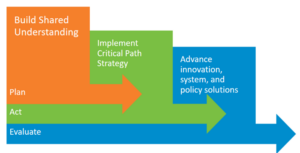
We believe that neglect is preventable. The goal of the Strong Families, Thriving Children, Connected Communities (SFTCCC) initiative is to reduce the number of family separations for reasons of neglect by building a community focused on collaboratively pursuing policies and practices that support overloaded families and address systemic failings. SFTCCC launched in early 2022 and is focused on building a shared understanding of the root causes of neglect to better identify critical pathways towards prevention.
Critical Pathways are specific problem/priority spaces that are focal points for elevating or designing specific and actionable system-level solutions. Through a progressive series of seven roundtables during the past year, we’ve worked with staff at Children’s Wisconsin, community members, and people with lived experience to identify systemic challenges, risk factors, and barriers to supporting families overloaded by stress.
Over the past month, we hosted four Conversation Cafes that explored Wicked Questions that were informed by our roundtables and four emerging Critical Pathways: 1) Poverty, 2) Systemic Racism and Mental Models, 3) Informal Community Supports, and 4) Systems/Service Coordination. During the remainder of this month, we will be analyzing the data that we have collected through these Roundtables and Conversation Cafes along with the emerging research in the field to prepare for our Critical Pathways Data Walk. On March 17th, we are hosting a virtual data walk to explore with community partners and stakeholders how these specific themes overlap with evidence from research and other data sources. Even if you haven’t been to any SFTCCC events before, we welcome all new interested parties to participate.
Quick links:
Virtual Data Walk Registration
Complete the SFTCCC Survey here.
If you are interested in learning more, participating in the upcoming Data Walk, and/or joining this initiative, please visit the SFTCCC project page or sign up here.
Recent and Upcoming Events
The Institute provides training, consultation and technical assistance to help human service agencies implement and replicate best practices. If you are interested in training or technical assistance, please complete our speaker request form.
- January 18th – Overloaded: Understanding Neglect podcast – Bonus Episode
- January and February – Strong Families, Thriving Children, Connected Communities – Conversation Cafes
- February 2nd – SWIM Speaker Series – Dimitri Topitzes
- February 8th @ Wisconsin Child Welfare Partnership for Professional Development
- February 21st @ Sojourner Family Peace Center
- April 20th @ Wisconsin Child Welfare Partnership for Professional Development
- February and March 2023 – Parent Child Interaction Therapy Therapist Training
- March 17th – SFTCCC Virtual Data Walk


